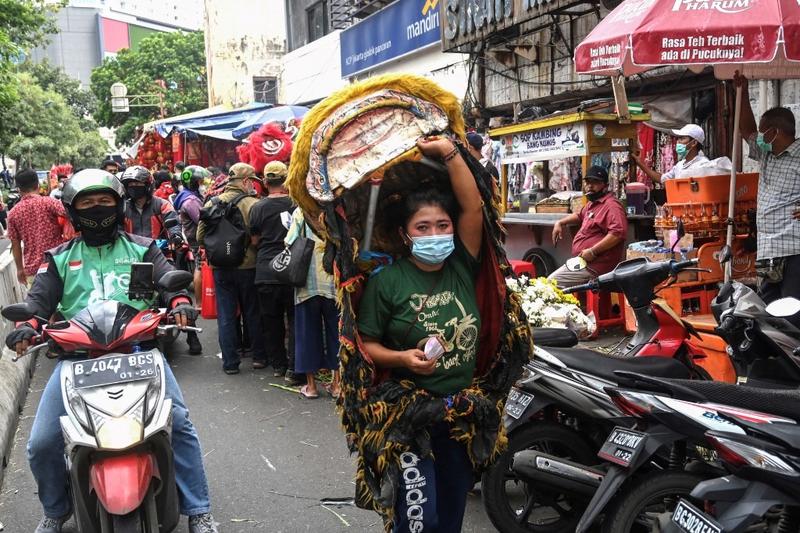 A lion dance performer (Center) looks out from underneath the costume next to stalls selling items for the Lunar New Year in Jakarta’s Chinatown on Feb 11, 2021, on the eve of the start of the Year of the Ox. (GOH CHAI HIN / AFP)
A lion dance performer (Center) looks out from underneath the costume next to stalls selling items for the Lunar New Year in Jakarta’s Chinatown on Feb 11, 2021, on the eve of the start of the Year of the Ox. (GOH CHAI HIN / AFP)
Special decorations in the lobby of the building that houses Indonesia’s Ministry of Religious Affairs have gone viral on social media these days.
The captivating display with its theme “Imlek”, or Chinese New Year, is a first from the ministry and regarded as representing a strong message to the nation from the newly appointed “pluralist” Minister of Religious Affairs Yaqut Cholil Qoumas.
The message is: Indonesia belongs to all citizens, whatever their background.
As Indonesians joined people around the world in ushering in the Chinese New Year with mostly virtual celebrations, the message sent a powerful signal that national harmony and solidarity is not to be taken for granted, and the contributions of ethnic Chinese to Indonesia’s progress is recognized.
The minister’s bold initiative drew a lot of buzz and made the local Chinese people, as well as those from other minority groups, feel proud and relieved.
For other Indonesians, it provided an opportunity to reflect on various historical aspects and developments related to ethnic Chinese in a Muslim-majority country.
We strongly believe that the Indonesian government will continue to strive for the growth of the spirit of"Bhineka tunggal Ika" (unity in diversity) in our country.
Tessyawan Tirta Senjaya, secretary of the Confucian Supreme Council of Indonesia, a Confucian sanctuary
In 2000, Indonesia’s then president Abdurrahman Wahid abrogated a 33-year old presidential instruction that banned open celebration of Chinese religion, beliefs and customary practices. His successor, Megawati Soekarnoputri, in March 2002 declared “Imlek” a public holiday, putting the Chinese New Year on par with religious holy days.
The two leaders’ moves made headlines and were welcomed by the ethnic Chinese community with great fanfare.
Those new policies followed the bloody May riots in 1998 that killed many people, destroyed properties -- mostly belonging to Chinese-Indonesians – and involved other horrors including many cases of rape. The anti-Chinese violence contributed to the fall of the longstanding authoritarian leader Suharto. Earlier, there were unfounded accusations that Chinese businesses were partly responsible for the country’s severe economic crisis following the Asian financial meltdown.
ALSO READ: Chinese New Year is a global event
Ever since, things have changed, albeit gradually. Imlek festivals are now freely held and involve other ethnic groups with Chinese lion dance performances being colored with local-traditional discos, firework parties and the handing out of angpao, or red envelopes. Such practices, in fact, had persisted for many decades before the anti-communist Suharto rose to power in 1967.
This year, a National Imlek Celebration will be held virtually on Feb 20, with the event featuring President Joko Widodo and other high Indonesian state officials and community leaders.
On Feb 11, one day before the Chinese New Year, Widodo sent his Imlek greetings, with the following words: “May all of us remain in solidarity spirit and be kept away from any diseases and disasters.”
Tessyawan Tirta Senjaya, secretary of the Confucian Supreme Council of Indonesia, a Confucian sanctuary established decades ago, said, “We strongly believe that the government will continue to strive for the growth of the spirit of ‘Bhineka tunggal Ika’ in our country.” Bhineka Tunggal Ika stands for unity in diversity.
As of now, Khonghucu, or Confucian, followers in Indonesia account for at least 0.5 percent of the country’s total population of 268.5 million people. They add to ethnic Chinese from other religions. The first Chinese migrants settled in the Indonesian archipelago in mid-seventeenth century.
Dali Santun Naga, a professor at Jakarta’s Tarumanagara University, said Imlek “has now become a subculture in Indonesia’s multicultural culture, which shows the nation’s cultural diversity”.
He added, however, that more should be done to help Indonesians better understand the core messages of Imlek.
Today, ethnic Chinese control a vast portion of Indonesia’s economy — some estimates peg the figure as high as 70 percent — and also serve as lawmakers and government executives, besides having a presence in the military and the police force. About eight people of Chinese origin rose to military general ranks in the past two decades.
Still, despite the strong presence of ethnic Chinese in the country’s economy, many real facts about their active involvement in Indonesia’s national movement and in its independence struggles had not been fully laid out, including in official history books.
“Eliminating such discrimination against ethnic Chinese is an absolution condition for this nation to move forward,” said Azmi Abubakar, founder of the Museum of Chinese-Indonesian Literature in the city of South Tangerang in Indonesia’s Banten province.
READ MORE: Foreign leaders send Lunar New Year greetings
“Without such efforts, any important programs to be carried out (by Indonesia) would not go smoothly and get stuck. Harmonious life is an absolute condition, without which everything would be nonsense,” said Abubakar, who is of Acehnese descent and an outspoken political activist.
The writer is a freelance journalist for China Daily.


